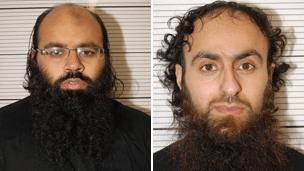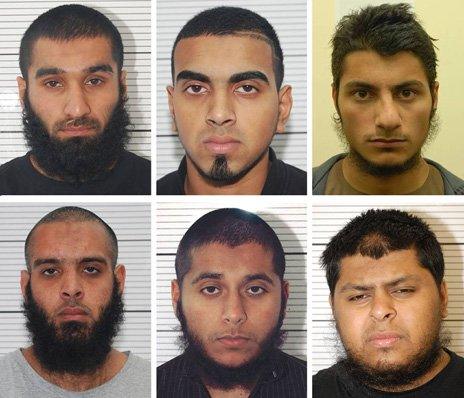Operation Pitsford: The 11 men
- Published
Eleven men have been jailed at Woolwich Crown Court, ending one of the largest ever counter-terrorism operations in the UK.
The investigation in Birmingham, known as Operation Pitsford, uncovered a cell of would-be suicide bombers who were trying to recruit others to their cause.
IRFAN NASEER AND IRFAN KHALID

Naseer (left) and Khalid recruited other men to be part of their plot
Irfan Naseer and his co-defendant Irfan Khalid had received training from al-Qaeda contacts in Pakistan. They had recorded martyrdom videos there before returning to the UK.
Although the court heard that Khalid was committed to the cause, it was Naseer who was the man with the skills and he was secretly recorded explaining to others about how to make a bomb. In one recording, he talked about making eight bombs. In others he indicated he planned to be a suicide bomber.
The pair recruited other men to pose as legitimate charity workers on the streets of Birmingham and they collected thousands of pounds from unsuspecting members of the public.
Naseer played the key role in sending four other Birmingham men to Pakistan to receive training.
Irfan Khalid told one member of the inner circle about how he had recorded his martyrdom video in Pakistan, in which he said he boasted that his attack was "another 9/11" and "revenge for everything". Naseer was sentenced to life with a minimum of 18 years after being found guilty of five counts of preparing acts of terrorism. Khalid was found guilty of four such counts and given 18 years, with a further five on licence.
ASHIK ALI

Ashik Ali provided a safe house as plans developed
The third key member of the conspiracy was Ashik Ali. He had not been to Pakistan but provided a safe house as the plans developed. The trial heard that he was helping to plan the early stages of the bombing campaign and he had been involved in fraudulent fundraising by posing as a charity worker. He had also helped to recruit others to the cause.
In his police interview he said that his plan would have been to wear a suicide bomb vest, have a gun and shoot people. He was sentenced to 15 years, with five on licence, after being found guilty of three counts of preparing for acts of terrorism.
RAHIN AHMED
Ahmed was heavily involved in the group’s plans to con local people in Birmingham to hand over cash by posing as charity collectors for a legitimate Muslim charity. He drove a car that was at the centre of the investigation after it was successfully bugged by MI5.
Ahmed convinced Irfan Naseer and Irfan Khalid that he could take the thousands being raised in charity donations and make more money by speculating on the currency markets. He lost £9,000 - and then lost the trust of the others. He was the first of the men to plead guilty, and was given a 12-year sentence, with a further five on licence.
MUJAHID HUSSAIN
Hussain was a potential recruit and he pleaded guilty to helping with the bogus charity work. He was seen collecting money on the streets of Birmingham and helping to bank it.
However, his precise role beyond helping to collect cash remains unclear. In one bugged conversation, the leading members of the group expressed doubts about Hussain’s resolve to commit acts of terrorism, even though he knew why they were collecting money. They said he had not performed a special period of prayer and reflection that they hoped would lead the potential recruit to sign up to all of the cause. He was sentenced to four years.

Ishaaq Hussain, Shahid Khan, Mujahid Hussain (top row, left to right), Naweed Ali, Khobaib Hussain and Rahin Ahmed (bottom row, left to right) were also jailed
BAHADER ALI
Ashik Ali tried to recruit his older brother, Bahader, to the cause. Although he helped with the bogus charity work he apparently had not signed up to the idea of a bomb plot. However, on one critical night in the conspiracy, as the police and MI5 were closing in, Bahader Ali was present at an important conversation with the ringleaders in which he was trying to find out more about the jihadist training they had received abroad. He also pleaded guilty to encouraging others to prepare acts of terrorism and was sentenced to six years.
MOHAMMED RIZWAN

Bahader Ali (left) and Mohammed Rizwan were sentenced to four and six years respectively
Another man who pleaded guilty. He was also present during a critical meeting in which he learnt more about the ideas and experiences of the leading members of the group. Rizwan was planning to go to Pakistan with his wife, and Woolwich Crown Court heard that he wanted to look into receiving training in a jihadist camp. Although he may have been identified as a recruit for a bombing campaign, he had not reached the point where he was at the centre of the cell, because the leaders were not even clear whether they wanted or needed him. In mitigation, his barrister told the court that he had resisted being recruited. He was sentenced to four years.
ISHAAQ HUSSAIN, SHAHID KHAN, KHOBAIB HUSSAIN AND NAWEED ALI
Irfan Naseer organised for these four young men to leave Birmingham and attend a militant jihadist camp in Pakistan, deep in the mountains four hours from Islamabad.
But immediately on their arrival at the camp in August 2011, they began to have second thoughts. By the time they had managed to get together - they had arrived in two pairs - they had decided to try to leave. They spent a night making urgent phone calls, with limited mobile phone battery life, back to their families in the UK. They had lied about their plans. Ishaaq Hussain had told his family he was taking part in a period of traditional prayer in a mosque in southern England. The families immediately organised their return to the UK, with the help of relatives in Pakistan. The families were furious about what had happened and went looking in Birmingham for the people who had played a part in persuading their sons to go to the camp. All four were sentenced to 40 months.
- Published26 April 2013
- Published21 February 2013